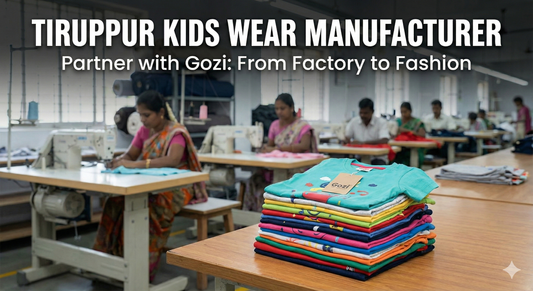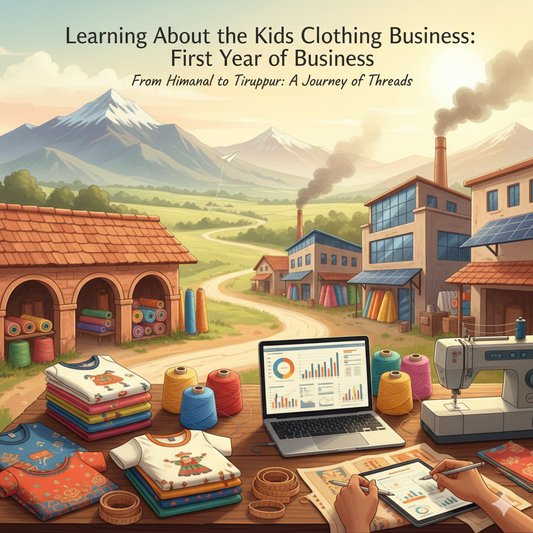
How Can Children Help Their Parents at Home?
Introduction: Building Life Skills Through Small Actions
At our kids clothing brand based in Tiruppur, we don't just create comfortable, quality clothes for children - we care deeply about their overall development. As a wholesale kids clothing manufacturer serving customers through Myntra, Amazon, and our own website, we interact with parents daily.
In India, it's incredibly common to see parents doing all household chores while children focus solely on academics or play. We're guilty of over-pampering our kids, treating them like delicate guests in their own homes rather than contributing family members. While this comes from a place of love, we might inadvertently be depriving our children of valuable life skills and character-building opportunities. It's time we rethink this approach, not because our children are burdens who must earn their keep, but because involving them in household responsibilities is one of the greatest gifts we can give them for their future.
The Science Behind Chores: What Harvard Tells Us
This isn't just traditional wisdom or parenting philosophy - there's solid research backing the importance of household chores for children. A landmark Harvard Grant Study, one of the longest-running studies on human development, revealed a powerful insight: children who do chores become more successful adults.
The study found that kids who helped with household tasks from an early age developed a stronger work ethic, were more empathetic, and were better able to collaborate with others. They understood the concept of delayed gratification, showed greater responsibility, and developed problem-solving skills that served them throughout their lives. Professional success, fulfilling relationships, and overall life satisfaction were all positively correlated with having done chores as a child.
But here's what makes this even more compelling: it wasn't about major responsibilities. The study emphasized that even small, age-appropriate tasks made a significant difference. The key was consistency and the understanding that everyone in the family contributes to the household's functioning.
Why Indian Parents Hesitate
Before we dive into how children can help, let's address why we hesitate. Indian parents often worry that chores will:
- Take time away from studies
- Cause physical strain
- Make children feel unloved or burdened
- Reduce their childhood joy
These concerns are valid but misplaced. Age-appropriate chores don't take significant time, don't cause strain, and actually make children feel more valued and capable. When a child successfully completes a task and sees appreciation from parents, their confidence soars. They feel like important, contributing members of the family rather than dependents.
Age-Appropriate Ways Children Can Help at Home
For Toddlers (2-4 years)
Even very young children can participate in household activities. At this age, it's more about building habits than actual help:
Putting toys away after playtime is perhaps the most fundamental chore. Create a fun routine with a cleanup song. This teaches organization and responsibility for one's belongings. Use colorful storage bins that make the task feel like a game.
Helping sort laundry by colors or family members is excellent for cognitive development. They learn categorization while feeling helpful. Let them put socks together - it improves their matching skills.
Placing their plates in the sink after meals introduces the concept that we clean up after ourselves. Even if they can't reach the sink, a small step stool solves that problem.
For Early Elementary (5-7 years)
Children at this age have better motor skills and can handle slightly complex tasks:
Setting up the dinner table is a wonderful responsibility. They can place mats, plates, spoons, and glasses. This teaches them about meal preparation, counting (how many people are eating?), and the value of presentation. It also makes them excited about family meals because they helped create the setup.
Making their bed every morning is a life skill that instills discipline. It doesn't need to be perfect - the act of doing it matters more than the result. A made bed also gives them a sense of accomplishment to start their day.
Giving water to elders and guests is deeply rooted in Indian culture and teaches respect and hospitality. It makes children aware of others' needs and develops their service mindset.
Feeding pets (if you have any) teaches compassion and consistency. Animals depend on regular care, and this responsibility helps children understand commitment.
Watering plants connects them with nature while teaching about nurturing living things. Give them their own small watering can and perhaps a plant to call their own.
For Older Children (8-12 years)
Pre-teens can handle more substantial responsibilities:
Taking plates away and rinsing them after meals is a natural progression from just placing them in the sink. This teaches the full cycle of mealtime cleanup and reduces parents' workload meaningfully.
Folding and putting away their own clothes develops organization skills and respect for their belongings. It also reduces the laundry burden on parents significantly.
Helping with grocery sorting when shopping bags arrive home teaches them about food categories, storage, and household management. They learn where things belong and why organization matters.
Preparing simple snacks like sandwiches or fruit plates develops basic cooking skills and self-sufficiency. Supervise initially but gradually allow independence.
Sweeping or vacuuming their room gives them ownership of their space. They understand that clean spaces don't maintain themselves - someone has to do the work.
Helping younger siblings with homework or getting ready creates a sense of family unity and leadership. Older children feel responsible and develop teaching skills.
Making Chores Effective and Positive
The key to successful chore integration isn't just assigning tasks - it's creating a positive environment around them:
Start early and stay consistent. Children who begin helping at age two or three see it as normal family life. Those introduced to chores at ten might resist more.
Show appreciation, not just expectations. A simple "Thank you for setting the table, it looks wonderful" goes much further than "You should do this."
Do chores together sometimes. Folding laundry while chatting, cooking together on weekends, or cleaning up after a party as a family creates bonding opportunities.
Never use chores as punishment. If cleaning their room becomes a consequence for bad behavior, they'll always associate household work with negativity.
Allow imperfection. The bed won't be perfectly made. The table setting might be crooked. The floor might have missed spots. That's okay - they're learning.
Connect chores to real-world skills. Explain how cooking helps them become independent in college, how cleaning develops attention to detail useful in any career, how helping others builds teamwork skills.
The Long-Term Benefits
When children help at home, they develop:
- Time management by balancing chores, study, and play
- Empathy by understanding parents' daily efforts
- Work ethic by experiencing that results require effort
- Self-sufficiency by learning practical life skills
- Teamwork by contributing to family functioning
- Confidence from successfully completing responsibilities
These aren't just nice qualities - they're fundamental building blocks for successful, happy adults.
Conclusion: Investment in Their Future
At our clothing brand, we create comfortable, durable clothes that children can play, learn, and yes, do chores in! But more importantly, we believe in raising capable, confident children who grow into responsible adults.
Letting children help at home isn't about reducing your workload (though that's a nice bonus). It's about equipping them with skills, values, and confidence that no school can teach. It's about showing them that they matter, that their contributions are valuable, and that being part of a family means everyone participates.
So the next time your child asks "Can I help?" - and they will ask, because children naturally want to be involved - don't say "No beta, you study, I'll do it." Instead, say "Yes! Here's how you can help." That simple shift might be one of the most important parenting decisions you make.








